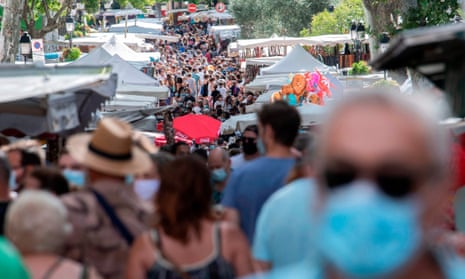France plans to make masks compulsory in almost all workplaces and Finland will ration common medicines in anticipation of a second wave this autumn as new coronavirus infections continue to rise around Europe.
Amid evidence from several countries that the increase on the continent is being driven mainly by younger people, the World Health Organization said 20- to 50-year-olds were also the main spreaders of the virus in the western Pacific region.
The French government said on Tuesday it would make wearing a mask obligatory in most indoor workspaces, including meeting rooms, corridors, changing rooms and open-plan offices, although not individual offices with one occupant.
The measure, likely to come into effect in time for the end of the summer holidays on 31 August, will be accompanied by a reminder that home working remains the employment ministry’s preferred option for most employees. Up to a quarter of new infections in Paris were recently found to have occurred in offices.
“The best thing we can do to prepare for the return from vacations is to reassure employees that, together, we are taking the precautions to avoid spreading the virus,” said Élisabeth Borne, the employment minister.
The rule, based on advice from the public health council, reflects a growing scientific consensus that the virus is transmitted not only in big drops projected when a person coughs or sneezes, but also in smaller ones suspended in air breathed out by infected people that accumulates in enclosed spaces, Borne said.
Masks are already mandatory in France on public transport and in enclosed public spaces such as shops and government offices, and are increasingly becoming compulsory at open-air markets, on busy streets and in tourist hotspots in many of France’s major cities, including Paris, Marseille, Lyon and Bordeaux.
The country has recorded 219,000 Covid-19 cases and 30,400 deaths. Since exiting one of Europe’s strictest lockdowns in mid-May, daily new infections have been steadily picking up and are now running at a seven-day average of nearly 2,500.
In Finland, the government said on Tuesday the sale of some commonly used medicines such as paracetamol and the anti-inflammatory drug dexamethasone would be restricted to ensure availability during the predicted next wave of the virus.
The country has recorded nearly 7,800 coronavirus infections and 334 deaths, but new cases have doubled to more than 20 a day since June. Users will be allowed to buy no more than three months’ supply at once to “prepare for a possible increase in global demand” during an autumn surge in infections, the health ministry said.
In Spain, where the seven-day average of daily cases exceeds 4,500, Médecins Sans Frontières published a damning report about conditions in the country’s 486 care homes, where an estimated 19,000 elderly people have died of Covid-19.
The report criticised the lack of institutional coordination and leadership as well as the failure of the health system to provide assistance, saying, “Keeping infected people in enclosed spaces without medical attention multiplied infections, accelerated mortality and created inhuman and degrading situations.”
The organisation added: “To a large degree, the problems were linked to structural shortcomings, precarious working conditions and spending cuts.”
About two-thirds of Spain’s new cases are asymptomatic, with an average age of 36, and the death rate remains relatively low. “The numbers aren’t good,” Fernando Simón, the head of medical emergencies in Madrid, said. “We’re not doing too badly, but things aren’t going the way we would have hoped.”
Poland’s health minister, Łukasz Szumowski, resigned on Tuesday amid growing criticism of the ministry’s handling of the crisis. Szumowski denied any wrongdoing, but both he and his deputy, Janusz Cieszyński, who has also resigned, faced calls to go over alleged irregularities in buying masks and ventilators.
Confirming a demographic shift in the virus’s spread, the WHO’s western Pacific regional director, Takeshi Kasai, said the epidemic was changing. “People in their 20s, 30s and 40s are increasingly driving the spread,” he said. “Many are unaware they are infected. This increases the risk of spillovers to the more vulnerable.”
Surges have been reported in countries that had appeared to have the virus under control, including Vietnam, which until recently went three months without domestic transmission due to its aggressive mitigation efforts.
Another WHO official, Maria Van Kerkhove, warned that the young were not invincible. “We are seeing young people who are ending up in ICU,” she told a briefing in Geneva. “Young people are dying from this virus.”
